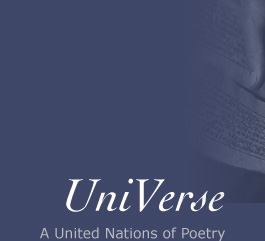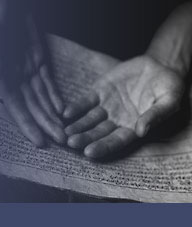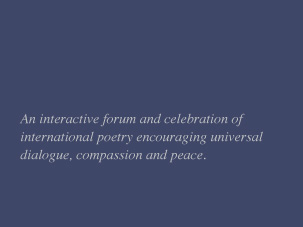| |
 |
 |
 |
Mohja Kahf is an Associate Professor of Comparative Literature, University of Arkansas, and the author of the novel The Girl in the Tangerine Scarf & Poetry, E-mails from Scheherazad. Kahf traveled to Turkey in 2011 to work with Syrians on refugee issues and civil society workshops. She has also conducted workshops for Syrian activists on pluralism and tolerance values in Chicago 2011.
|
| The Fallen Protesterís Song |
English |
 |
|
 |
|
English
version
The Fallen Protesterís Song
(RIP Ghiyath Matar, Sept 9, 2011, whose name means "deliverance rain")
These last few days were the most beautiful
I ever lived, my friends. For the first time
in our lives spent under martial law,
we took the secret freedom weíd been eating
out of the hidden cupboard, and ate it openly.
Then we took it right outside like melting ice cream
and started giving it away. To anyone.
After that, we were free.
I donít know how to explain to those who havenít tasted it.
Imagine an entire country with a calcium deficiency,
long-term, and everybody shrinks, but no one notices.
People smelled the free on us, like win on a horse, and loved us,
gave us secret bits of their food wrapped in warm bread,
beginning to free themselves, so that one day
the inside and the outside of people
will no longer be split bloody trembling down the middle,
like I was by the bullet spray of soldiers sent to shoot us,
then by the stateís torture-doctors. They cut my insides out,
trying to find the freedom and extract it surgically.
Thatís what they do, those who have lost half
their humanity, they try to make half-humans out of everyone.
My friends, you are heaving a giant iron shelf,
off the limbs of people whose bones it crushes.
Soon it will yield to the weight of all your shoulders.
Remember me when that happens.
We worked for it together.
You were as ready to die for it as I was,
but it happened to be me. So when you write a word
on a wall for all to see
and it doesnít have to be in code,
and no one breaks the hand that drew it,
when freedom is no longer treated like a narcotic,
dosed in hidden little baggies only for the few,
but becomes like photosynthesis in plants,
processing light in every leaf,
when everyone can be openly free,
when freedom falls like a deliverance rain,
then, my friends, remember me.
|
 |
 |
| For the Free Syrians Behind Bars |
English |
 |
|
 |
|
English
version
For the Free Syrians Behind Bars
You, shoulders hunched on cots in prison cells tonight,
you whose bodies are bound in rubber tires
or hung by meat hooks (for bludgeoning),
you who are dragged to torture tables by your hair,
to sit with vertebrae force-arched beyond their stresspoints,
may our love reach you tonight. May it come between
the truncheon and your jawbone, may it weaken
every jolt from cable taped to your flesh.
When interrogators finish with you for the night,
may you feel this balm we wipe on your skin: our love,
we anoint you with it. Our honor for you, our cherishing, let it come
quietly to your side, touch your forearm, succor you.
Here, take my pillow, if I could send it to you; anyway,
Iíve little use for it; I see your faces, and my eyelids open.
Hanadi, Yahya, Deya, Majd, Ziad, Ahmad, Malak, Omar, Ghassan,
Maan, Rafah, Hazem, Guevara, Amr, Marwa, Tareq, Anas, Juwan,
Shadi, Raji, Mohammad, Alaa, Moaz, Emad, Bilal, Ali, Talal, Amer, Zain,
Tal, Tahama, Osama, Yaqub Hanna Shamoun, Ahmad Thani Abazid,
and every other prisoner, especially those yet unnamed,
unlisted anywhere, snatched by dictatorshipís police
without a word reaching family or neighbors,
without an online page to tell the story,
do not think you are alone. You are not alone in that stone cell.
We hear your voice, no matter how they muzzle your mouth;
You are free, no matter behind how many locks.
Do not think you are not powerful. You are powerful.
You are the muscle and sinew of truth flexing. Hold on,
my brothers, my sisters. You are whole humans among those
who have dwarfed their humanity. They are mutilated, limbs bent
into tasks of hatred, contorted, crooked, spent. You
throb with life and love. You are precious to us: that loopy grin,
your high-elbowed billiards shot, the thumbpad you lick
before you deal the cards for trumps, the cheeks
your children or parents kiss, the wholesomeness of organs
by which you had or may have children.
We are scrabbling with our hands
through barbed wire to get to you. Whisper to us,
even if you cannot move your lips. We hear you. Sip a little bit
every day of this love we pour for you, and may it be as sweet
as Ayn Fijeh water on your tongue. We would bring it in our hands for you.
Our hands clasp your hands, pulling. Hold on tight.
|
 |
 |
|  |
|





